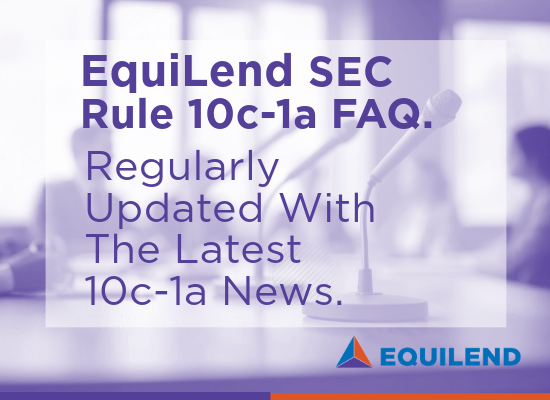
SEC Rule 10c-1a Frequently Asked Questions
Our 10c-1a FAQ dives into components of the rule, implementation, timelines and the benefits of using EquiLend to support your reporting requirements.
The U.S. Securities & Exchange Commission’s (SEC) final rule 10c-1a is designed to provide investors, other market participants and regulators with access to loan rates and other material information regarding securities lending transactions in a timely manner. Repo transactions are out of scope.
Lenders are required to report loan transactions and modifications. Borrowers are required to report transactions when the borrower is a broker-dealer when borrowing fully paid or excess margin securities. The SEC believes that this will improve price discovery, increase market efficiency and aid regulators’ oversight of this important market.

Utilize existing & new products to fulfill 10c-1a reporting

Retention of trade reporting data on EquiLend servers to be readily available for regulator/client access

Dedicated team to provide daily product support & monitor SEC activity for future regulatory changes
![AdobeStock_605385825-[Converted] AdobeStock_605385825-[Converted]](https://equilend.com/wp-content/uploads/elementor/thumbs/AdobeStock_605385825-Converted-qefzikdnmz06pqapbajumtrsxjwpoyf1u9vnmadjh4.jpg)

EquiLend intends, and is well placed, to provide a reporting solution for clients

EquiLend is a registered broker dealer and therefore has the required regulatory status to act as a Reporting Agent

EquiLend already captures large volumes of intraday and end-of-day transaction and position data in our existing solutions (OneFile, SFTR, Spire, etc.)

EquiLend has heritage/experience in the reporting space gained through the development of solutions for ALD and SFTR processing and reporting

EquiLend is also well placed to incorporate data on securities lending published by an RNSA into its range of Data & Analytics solutions
What’s the difference between SEC 10c-1a and SFTR?
Dive into the details of our side-by-side comparison of SEC Rule 10c-1a and the European reporting rule SFTR.
Regulation Release
Final Rule 10c-1a Becomes Effective
FINRA Implementation Proposal
SEC Action on FINRA Requirements
FINRA Proposed Rule in Effect
FINRA SLATE v1.1 Released
FINRA Request for Extension
FINRA SLATE v1.2 Released
SEC Grants Compliance Extension
SEC Extends Compliance Date to September 2028
Regulation Go-Live
FINRA Public Reporting Go-Live

Our 10c-1a FAQ dives into components of the rule, implementation, timelines and the benefits of using EquiLend to support your reporting requirements.

We previously highlighted the challenges relating to effected vs. settlement, omnibus vs. allocation trades and rules for reporting evergreen trades under the SEC’s 10c-1a final rule. As we inch closer to the May 2 publication date of FINRA’s 10c-1a rule interpretation, we explore 3 additional ambiguities that, without clarification, could hinder a smooth compliance.

EquiLend’s Kevin McNulty, Head of RegTech Solutions, dives into some of the intricacies of 10c-1a implementation while providing an analysis of the challenges and how EquiLend’s 10c-1a solution will support clients reporting needs.

In our latest analytical piece, we explore the purpose, scope and legal challenges surrounding the implementation of SEC Rule 10c-1a while diving into how EquiLend’s ecosystem of solutions is uniquely positioned to help the market comply with 10c-1a’s reporting requirements.

EquiLend’s Kevin McNulty, Head of RegTech Solutions, reflects on speculation around the proposed SEC 10c-1 rule while considering the impact on markets and liquidity.

In our latest insight piece, we explore the impacts of the Securities Financing Transaction Regulation (SFTR) in the EU and UK, and the potential implementation of mandatory reporting for securities lending transactions in the U.S. under the proposed SEC 10c-1 rule.

EquiLend’s Dimitri Arlando, Head of Data & Analytics Solutions EMEA & APAC, sat down with Global Investor Group to discuss the facts, figures and trends seen throughout 2022, the evolution of beneficial owners and more.

EquiLend’s Kevin McNulty, Head of RegTech Solutions, sat down with Securities Finance Times to reflect on current challenges faced by market participants and how EquiLend is meeting these concerns with solutions.
